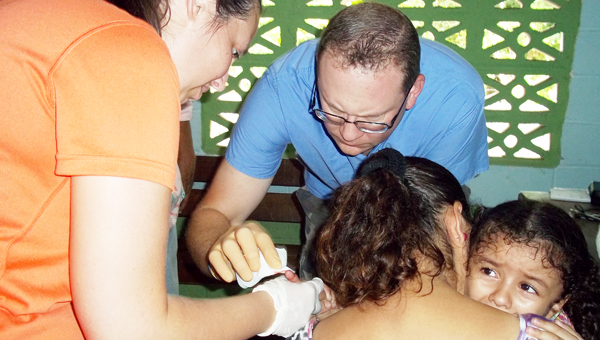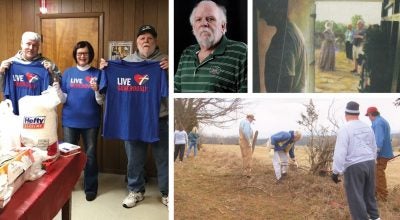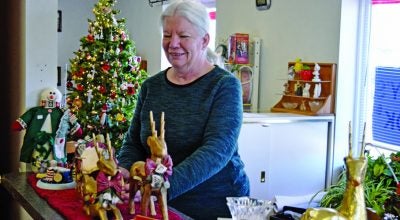Mission of hope, helping
Published 12:00 am Sunday, September 11, 2011

Dr. Trey Blake fixes an injured finger for a child who came to one of the free medical clinics in Honduras during a Jeremiah 38 medical mission trip
This was no end-of-summer vacation; this was a genuine mission.
Recently, 27 people from the Tri-State made a nine-day trip to the Central American nation of Honduras.
The 27 people included two doctors and 14 nurses who would dispense free medical care to people who can barely afford to eat, much less pay for a doctor’s visit.
The rest of the 27-member team were there to help Honduran churches spread the Gospel.
What they did
The trip was organized by Jeremiah 38 Ministries, a Lawrence County organization that aims to spread the Gospel of Jesus Christ around the world. Jeremiah 38 members had made trips to Honduras before, but this mission would be different. In addition to preaching the Gospel, they would take along doctors and nurses to care for those who were sick.
Honduras has hospitals and doctors but most people can’t afford to pay for medical care even when they are desperately sick. Even simple medicines are beyond their reach. So they do without even aspirin and antibiotics.
The group conducted medical clinics three of their five working days, with assistance from local pastors and others who served as translators.
The medical team treated 1,400 patients during their stay, registered nurse Mary Ellen Smith said. Each day they conducted two free clinics. Each clinic had a registration area, triage, examination rooms and a pharmacy.
But there was also at each clinic an area to address spiritual health, staffed by local pastors and non-medical people on the mission team. There was a place for the children to play.
“We’d have 150, 200 people each day at each clinic,” mission organizer Scott Bowling said. “They would be lined up as far as you could see. And this was in 90-degree (heat), 100 percent humidity.”
Temperature is more than just a number in Honduras: Air conditioning is an infrequent luxury.
Smith said, in spite of what Americans would consider oppressive weather and oppressive economic conditions, the people who came for help were appreciative.
“They people were so eager,” Smith said.
“Honduras is a country that is rich in natural resources with its beaches. It’s a tropical paradise. But there is a lack of development in areas that almost eclipses the ability of some people there to enjoy that beauty. Their attention is focused on day-to-day survival,” Bowling said.
What they saw
“We saw everything,” Bowling said. “We saw a lot of general body aches and pains and fevers that had gone on a long time. We had people asking for anti-parasitic medicines.” That would include such things as hookworms and tape worms.
“One lady asked for worm medicine for her 5-year-old daughter,” Smith recalled. “Her 7-year-old daughter had already died from worms. I feel like the anti-parasitic medicines (we took) really helped.”
Smith said getting worms and other parasites is not only common, but hard to avoid: sanitation is grossly lacking and in some places sewage runs in the street where children play in bare feet.
“That’s just something you never see here,” Dr. Tim Daly said of the parasitic diseases.
“We had a 12-year-old girl come in one day and she told us she didn’t need anything but she had an 11-month old brother who was sick,” Bowling recalled. “So we made a house call and the baby was very dehydrated, very malnourished.”
The child made an impression on those who met him.
“They lived in a little 5X5 shack with a dirt floor and the baby was in this sling (to keep him up off the floor). The mother probably weighed 80 pounds. The baby was a year old and weighed 11 pounds,” Smith recalled. “He was just lifeless.”
The child was taken to a local hospital and is now recuperating. The medical mission group paid for the hospital stay, lab work and other care for the child.
“It was a continual flow in,” Bowling said. “We saw people with high blood pressure, diabetes, people needing antibiotics, Tylenol.”
Antibiotics are a necessity many Hondurans can’t afford and therefore go without, making treatable conditions worse.
“They’re dying of something simple,” Smith said. “We get strep throat and we take medicine; they get strep throat and for them it can be deadly.”
Smith said they encountered two children who had eye conditions that, if caught early, would have been treatable. But these children were not among the fortunate few. Their eyes were not treated early and they will eventually go blind.
“There was one community that had no dads. It was women and children and the women would work to make a little money and the kids, 2, 3, 4 years old, would run around with no parents, no food, all day long.”
Smith said she remembered one little boy who cried and cried and at first no one knew how to help him. Then he told them why he felt so bad. He had not eaten in three days.
“He needed some food,” Smith said. “He was the one who came to us but what about the 500 who didn’t?”
Smith said she knew the circumstances would be bleak but also knew there were people who needed help.
“My belief is, it is our responsibility to help,” Smith said.
Bowling pointed out that some families who came for help often received care that would have cost them two weeks pay.
“We visited one village where 80 percent of the people were HIV positive,” Smith recalled. “We saw some really sick people.”
While some may wonder why the mission team went all the way to Honduras, when there are needy people here, Bowling is matter of fact.
Yes, there may be needy people here, but the United States has safety nets for its neediest that people in other countries can only dream about, he said.
And sprinkled among the clinics and the big people concerns, mission trip members got the chance to spend time with the children who came.
“I wasn’t directly involved in it, but I enjoyed seeing the kids play,” Daly said.
Message given
While families waited at the pharmacy to get their medicines, local pastors and the team from the U.S. talked to patients about Jesus Christ. During the clinics, 55 people became Christians; another 30 rededicated their lives to Christ.
“I talked to one lady who had lost a daughter and she said since then she had been searching for God,” Bowling recalled. “Time and time again we heard situations like that.”
Smith recalled one village where people practiced voodoo, but seemed hungry to hear about Jesus Christ.
“They really took it in,” Smith said. “I know we did a lot of good with the medical (clinics) but the (Gospel) mission will help for eternity.”
Local ministers, such as the Rev. Jorge Duran, pastor of a Baptist church in La Cieba, secured locations and translator and told the people the mission team was coming. Duran was the primary coordinator in Honduras.
Hopes for the future
Some of those who went for the first time told others who had gone on previous missions that it was as though their eyes were opened to the way the rest of the world lives.
“One of our sermons while there was about getting out of your comfort zone. This was the first time my church has done something like this. We are a very homegrown church and do a lot for the local community. But we have not done a lot of mission work,” Dr. Trey Blake said in an email to Bowling after the group had returned home. This was his first time making the trip to Honduras. “Thank you again for this wonderful chance to get out of my comfort zone. The experience will be with me for a lifetime.”
Bowling said the success of the mission was beyond his expectations.
“Sometimes God will do that for you,” he said.




